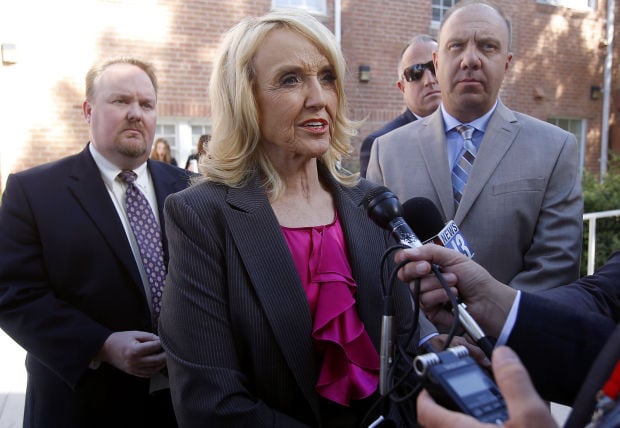Gov. Jan Brewer asked the Arizona Supreme Court on Thursday to quash efforts by a minority of state legislators to effectively kill the expansion of the state’s Medicaid program.
Tim Berg, her lead attorney, acknowledged that the levy on hospitals that finances the addition of hundreds of thousands to the program was approved last year by only a simple majority.
And he did not dispute that more than a third of legislators, all Republicans, voted against the measure. That would be enough to block the move if, as the dissident lawmakers contend, the levy is really a tax — something which can take effect only with a two-thirds vote of both the House and Senate.
Berg told the justices, though, that’s all legally irrelevant.
He said the only ones who have legal standing to sue are the hospitals that are paying the $256 million a year. And they have chosen not to do so.
But Chief Justice Scott Bales told Berg that ignores a simple fact.
“The hospitals, they don’t really have an immediate interest to object because they’re going to, on balance, get more back in reimbursement than they’re likely to be prospectively assessed,” he said.
That’s because the law gives Tom Betlach, director of the Arizona Health Care Cost Containment System, unfettered power to decide how to impose the levy — Brewer calls it an assessment — even to the point of excluding some hospitals. And figures prepared by AHCCCS, the state’s Medicaid program, show the hospitals will benefit financially from the expansion: More people with insurance means fewer people showing up unable to pay their bills.
Berg responded that it does not matter if they choose not to sue.
“The question is not whether someone will challenge it,” he told the court. “The question is whether they can challenge it.”
Brewer, who attended Thursday’s hearing at the James E. Rogers College of Law at the University of Arizona, said afterward that any question of whether hospitals were, in effect, bribed not to sue is “insulting.”
“We did what we did because it was the right thing to do,” she said.
Before this year, Arizona provided free care to most of those below the federal poverty line, a figure of $19,790 for a family of three.
Last year’s vote was to expand that to 138 percent of the federal poverty level. Ultimately about 275,000 were added to the AHCCCS rolls; current enrollment currently exceeds 1.4 million, not counting long-term care.
While most of that expansion is financed through the federal Affordable Care Act, there is still some cost on the state. Brewer pushed through a proposal, on a simple majority vote, to have the state cost absorbed by the hospitals, with a prohibition against them passing on the additional cost to patients or private insurers.
The GOP lawmakers who voted against it — more than a third of both the House and Senate — sued.
Christina Sandefur, an attorney for the Goldwater Institute that represents the dissident legislators, said the fact hospitals could sue is “sort a red herring.” She said any injury to them is separate from the injury to her clients — and to voters of the state who in 1992 amended the Arizona Constitution to require a two-thirds vote of both the House and Senate for any new tax.
“It was actually their dissatisfaction with the prerogative of the majority (to hike taxes) that caused the voters to pass this legislation,” she told the court. And Sandefur said voters were so insistent that there be no new taxes they said the two-thirds requirement exists even in cases of emergency and “even in situations for programs for the poor.”
Sandefur argued that voters specifically empowered a sufficiently large minority of lawmakers to block tax hikes.
Berg, however, had a different view of the constitutional provision.
“The purpose of the statute isn’t to protect the right of legislators to vote,” he told the court. “It’s to protect taxpayers.”
But Justice Robert Brutinel questioned how far that logic goes.
“What if they had said ‘We’re not going to count the votes of red-headed legislators on this particular issue,’” he asked. But Berg was undeterred, saying the redheads would not have a right to sue.
“The proper plaintiff in that case is the person to whom the statute applies,” he responded.
If the court sides with Brewer, the challenge goes away.
But even if the justices side with the challenging legislators, that does not mean they win. All that would do is give them a chance to convince a trial judge that the levy is in fact a tax and, because it did not get a two-thirds vote, it cannot be collected.
Brewer said that would cause fiscal chaos, as the mandate to care for those with up to 138 percent of the poverty level would remain, but there would be no money to pay for their care.
The other option at that point would be for legislators to repeal the expansion. But Brewer said that would cause real financial problems, especially for rural hospitals that would once again have to provide care for large numbers of uninsured patients.
Berg gave the justices a backup legal theory of why they should dismiss the lawsuit.
He said even if the minority of legislators has standing to sue, they’re suing the wrong people. He told the court that nothing done by Brewer or Betlach, the defendants in the case, undermined their votes.
“If they had somebody they needed to sue, it was the other members of the Legislature,” he said.
The justices gave no indication when they will rule.
Brewer won the first round when a trial judge threw out the case. But the Court of Appeals, in a unanimous ruling, agreed the dissidents have the right to sue.






